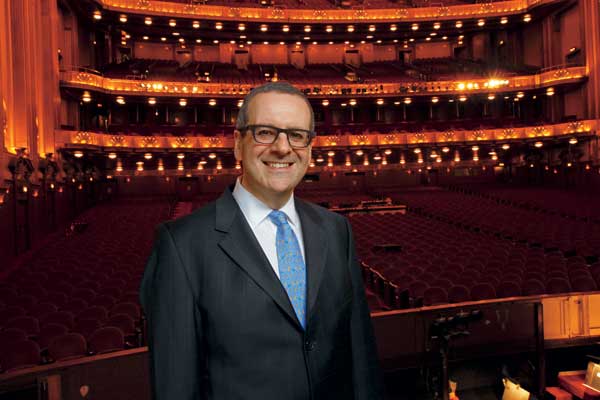Yesterday was Christmas morning for Chicago opera lovers. Lyric Opera of Chicago announced its next season, beginning with Mozart’s Marriage of Figaro and running through the next installment of the company’s Rodgers and Hammerstein project, The King and I.
The 2015–16 season for Lyric marks the first in which Anthony Freud, the general director, had a blank slate to program (he started in the position three and a half years ago). But yesterday, Freud’s first statement undercuts the whole premise of this article. “Although this is the first season for which there were no concrete commitments, I feel completely responsible for all the seasons since I’ve started,” he said. “The difference between the 2015–16 season and those that have come [already] during my time here feels less significant than your question suggests.” Freud went on to undercut it from another angle too, pointing out the role of Lyric’s music director, Sir Andrew Davis, in planning, and the importance of the many other artists—instrumentalists, singers, conductors, directors, designers, and so forth—that make Lyric what it is.
When asked about programming, Freud took the big-picture view, stressing the importance of a mix of operas in terms of style, date composed, and popularity. He said, “Lyric’s role is to provide a combination for our audiences, from core masterpieces to lesser-performed repertoire and new work. Every season we need to find a new mix to energize and engage our audiences.” Each of the last three years, for example, Freud has been asked at the season announcement about the absence of baroque opera in the upcoming season. (The last was Handel’s Rinaldo, in 2011–12.) Each time, he has appealed to his ten-year plan, promising Handel in the unannounceable future.
Okay, I think. Surely Freud’s predecessor as general director, William Mason, would agree with the principle of a prudently curated mix of operas. I asked Freud to distinguish himself from Mason, and he declined to do so himself: “Bill and I are different people,” he said. “I’ve known and respected him for decades. He has become a good friend. Our tastes, our differences, the analysis of how they’re different—it’s self-explanatory.” I interpreted this as an invitation to perform my own analysis. And so naturally, I did.
Here’s my take: Freud is cultivating a big-tent Lyric, where the tools and skills of an opera company are put to work both in continuing to satisfy loyal subscribers, and in promoting new works for new audiences, and doing so in a way that encourages audiences to attend all types of productions, no matter their entry point.
Discussing next season’s mainstage productions, Freud pointed to the four that Davis will conduct: Rossini’s Cinderella, Lehár’s The Merry Widow, Berg’s Wozzeck, and Jimmy López’s Bel Canto. The chronological and stylistic range illustrates Freud’s broad mix. Cinderella is a bel canto opera from 1817. The Merry Widow is operetta, 1905. Wozzeck, atonal, 1925. Bel Canto, which sounds modern but not scary, judging from a workshop performance this past summer, will be a world premiere, Lyric’s first since William Bolcom’s A Wedding in 2004.
Looking closer at the mainstage season, there are glimmers of the big-tent philosophy. Cinderella, for example, appears with its more-accessible English name heading the publicity materials. At the press conference, Davis referred to it by its Italian title, La Cenerentola, the more-common opera-world title—and what Lyric called it in its last production in 2005–06. Also, unlike last year, the musical The King and I is classified as the ninth core production. Freud says that's because the boundary between opera and musical theater isn’t useful. “I think we’re beginning to break down that boundary,” he says. “I don’t think there’s a benefit to defining the boundary, and I’ve never found the definition that actually works successfully.”
And looking farther, to the arm of Lyric called Lyric Unlimited, a kind of catchall for Lyric’s activities outside its mainstage season, you can see an explosion of new work designed to appeal to a broader demographic. After listing Lyric’s world premieres in the press conference, noting that Bel Canto will mark number 7 for the mainstage, he threw in that, oh yeah, Lyric Unlimited has three world premieres coming up in the remainder of 2015: the klezmer opera The Property, premiering February 25; the mariachi opera El Pasado Nunca Se Termina, March 13; and Second Nature, a children’s opera premiering at the Lincoln Park Zoo in August.
Not to get all Jacques Derrida on you, but consider the term “Lyric Unlimited.” The word “unlimited” implies that in the opposite realm, on the mainstage, Lyric is limited. The future Freud seems pointed toward breaks down that boundary between limited and unlimited—the musical has already seeped across—deconstructing the categories defining what is and isn’t part of Lyric’s universe. Tellingly, Freud frequently says “audiences” instead of “audience.” Lyric will always have La Traviata. Freud will show us what else.




